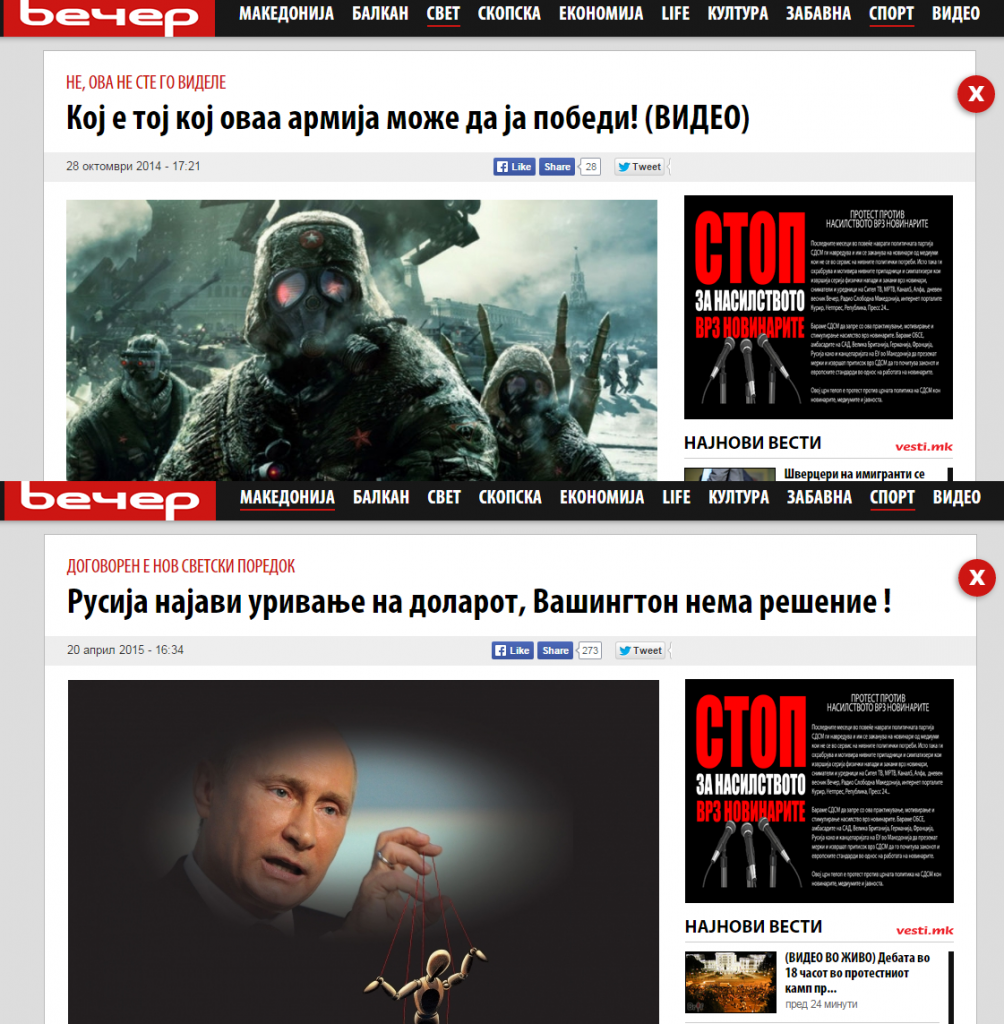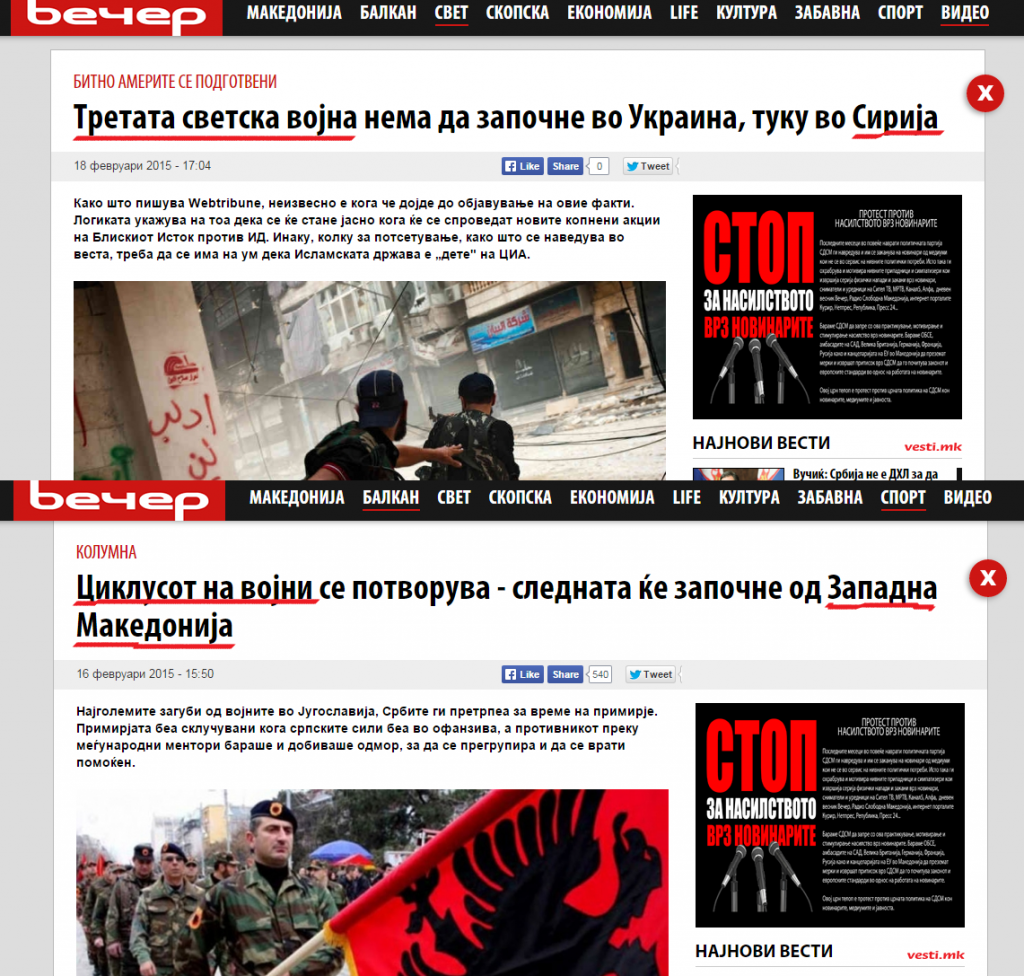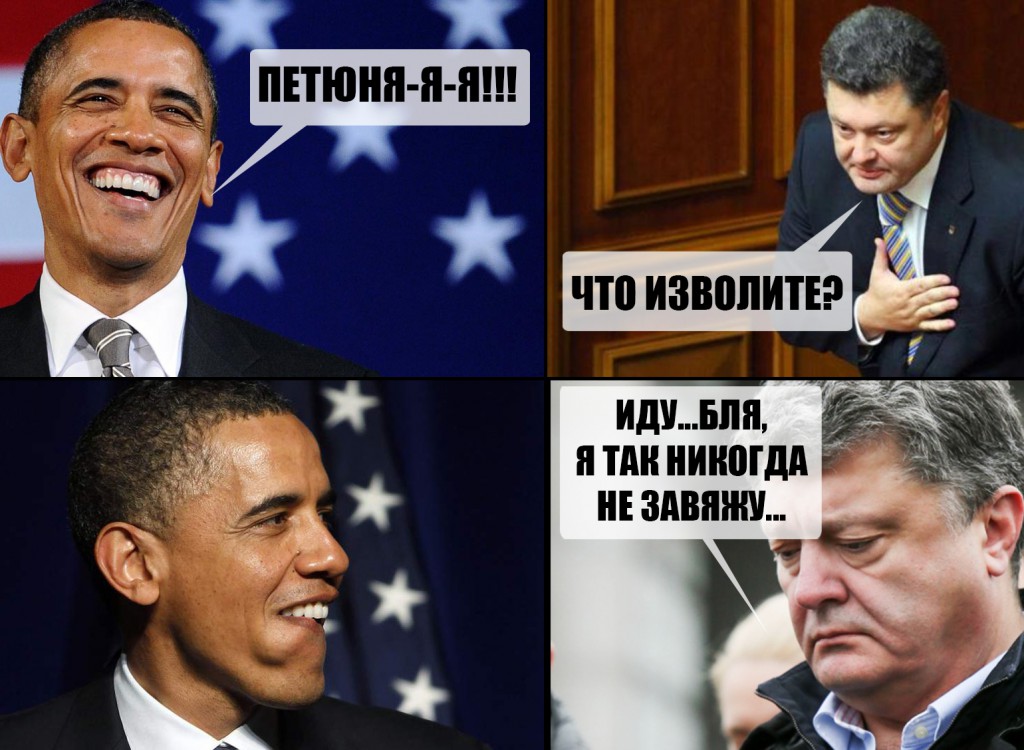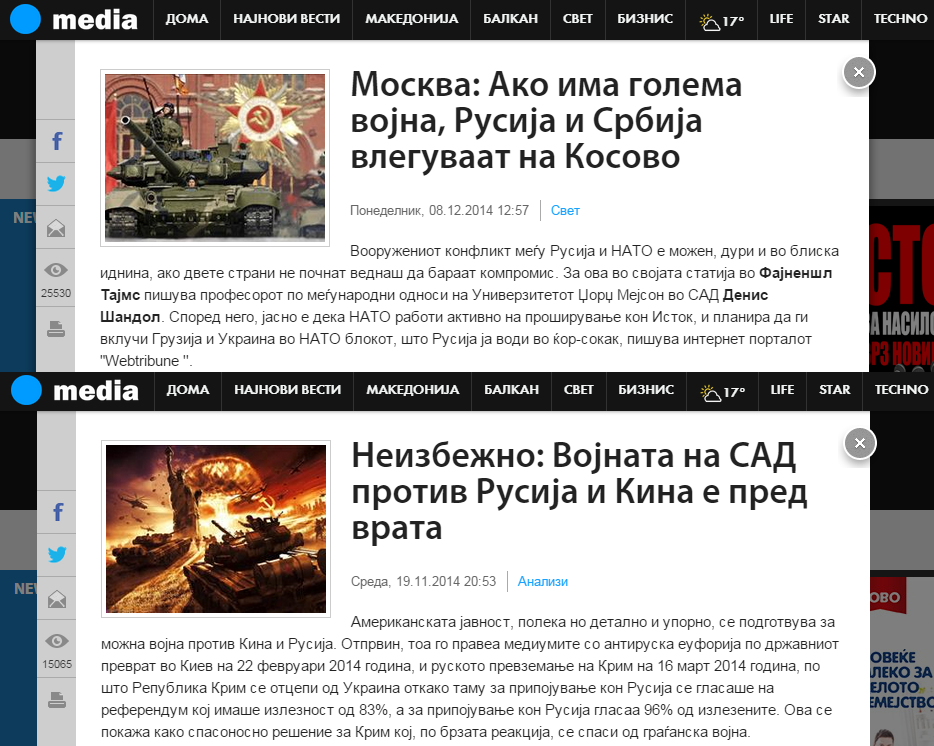Kremlin’s Propaganda in and around Macedonia
Published in Journalistic Lessons • Uncategorized @en
on 28 - 05 - 2015 Author: Vladimir Petreski
Kremlin on the offensive: Russian army is the best, the Dollar toppled, Putin as the smartest of all
Author: Vladimir Petreski
“The idea of one universal reality is a form of intellectual racism”
– Russian crypto-fascist A. G. Dugin
The column by Mirka Velinovska, published on May 15, 2015 under the title “‘Pavement-revolutionaires’ will party against Macedonia,”* brought the pro-Russian propaganda in Macedonia to a new level in regard to use of terminology, brazen-faced villainy, and the dynamics. Deeming the western ambassadors in Macedonia “representatives of American-European fascism,” using phrases such as “Euro-Atlantic fascism” represents a bоundary stone for Russian propaganda in the country and shows momentum and offensiveness used elsewhere. This vocabulary gives the propaganda a pre-war, anti-Maidan dimension, if we take into consideration that Putin’s propaganda functioned in the same manner in Ukraine more than a year ago, during the pro-European demonstration in Kiev.
During the winter and summer last year in Ukraine, considering the specifics of Ukrainian history, marginal Neo-Nazi groups received disproportional importance in order to discredit the pro-European Maidan movement. Unfortunately, that propaganda had a degree of success in some parts of Europe, to the level of presenting new Ukrainian authorities as Nazi, even though at the post-protest elections such groups won only 2% of the vote, which is way bellow the European average. Unfortunately, some Macedonian media circles also use the term Neo-Nazi when referring to new Ukrainian authorities to this day. Moreover, another illogical element of these conspiracy theories is that the U.S.A. were the puppet-master behind the Maidan protests, implicating the against the grain notion that the U.S.A. supported Nazi gaining power in Ukraine. But Putinist propaganda does not take logic into consideration. The most important priority is to pile up qualifications, one after another, as many as possible, and not even think about the contradictions, as the first lie is covered by many new lies. Untangling such knot of lies, when released in the public, is quite hard.
Propaganda with regional approach
Russian propaganda had spread its tentacles through Macedonian media for a while now, and not only through existence of Russian propaganda outlets in the country. Such is the supplement Russian Word („Руска реч“) printed in the daily newspaper Nova Makedonija, and published through its website with the same name. Russian Word is part of a network present in number of countries. And while these outlets have a dose of officialness, of distance and positivist approach, the contents peddled within Macedonian media is something else.

Typical Kremlin: Wars begin wherever it suits the propaganda. Vecher articles titled: “World War Three will not start in Ukraine, but in Syria;” “The cycle of wars repeats itself – the next one will start in Western Macedonia”
An interesting and specific example of Russian propaganda in Macedonia published before the onset of the current political crisis is the column “Eurasia via Macedonia,” claiming that U.S.A. will loose its primate in the world and that Russia will become the dominant factor due to Global Warming. Namely, American airplanes will not be able to fly (due to large turbulence because the air will be too dirty), their ships will not be able to navigate (due to high waves, caused by the Warming), and because Putin would not need airplanes and ships to conquer Eurasia as main landmass on the planet. The column presents Putin as very clever because he allegedly relies on railway transport, which will be the key factor in his success. Such science-fiction emanations in the form of a column by an editor in chief, directly rooting for Russian side, are entangled with constant conveyance of pro-Russian propaganda articles, mainly copied from Serbian websites. Such Serbian websites are indeed made to serve as sources for Putinist propaganda in the whole region of former Yugoslavia. In Serbia, which is percieved as Russian propaganda, political and economic base in the Balkans, exist a bunch of authentic pro-Russian websites:
- Pravda [“Justice” also the same name as most famous Russian newspaper]
- Srbi na okup [“Serbs Together”] with a special section “Novorossiya,”
- and Vaseljenska [“Universal” in religious sense] – with a special section “Russia”.
A website named Webtribune.com (partner website to Webtribune.rs), without impressum or named editor in chief, serves the purpose of feeding other pro-Russian websites or those which occasionally publish pro-Russian propaganda in the region. These articles, before the acceleration of Macedonian political crisis, mainly dealt with international geopolitics, praising Russian military might, stressing the role of Russia as defender of its allies in case of war, mentioning it together with other influential countries, in order to show that it remains an integral and indispensable part of the global agenda, and sometimes as a factor that can present military oposition to the U.S.A. at any time.
The onset of the political crisis in Macedonia lead to publising of number of selected articles with spin directly about Macedonia, serving Russian propaganda agenda. Surprisingly large proportion of these articles talk about state of war or imminent war, as if blood is about to burst at any time, and the cannons are ready to start shelling. Here and here one can see a partial list of articles that Macedonian pro-government web pages republish from this website (at least those that mention the source, which is not common, so the actual number is much higher). Almost all of them mention Russia in positive light, or attack the West. Then, their publishers promote some of these texts through paid advertisements on Facebook, in order to reach a larger segment of the Macedonian audience. This is somewhat unusual from a market point of view, as the texts about global geopolitics are not so receptive for the general public. Therefore investing in the paid promotion of these particular articles (and not others related to other topics) on the most popular social network in Macedonia indicates arrangements at some other level.
Soviet propaganda against The Beatles and current Putin propaganda.
Considering all this, it is not surprising that the whole propaganda by Macedonian authorities in the last several years, and in particular in the last few months, stems from the manuals of Russian “polit-technologists” in service of Putin, and the Serbian infovandals who served Miloshevic. However we are now witnessing the onset and amplification of authentic Putinist propaganda in Macedonia, as well as in the global media used for Russian propaganda, using Macedonia as bargaining chip for Russian interest in the region. Finally, there’s no other explanation for all those Russian news teams, who in suspiciously large numbers crisscross Skopje and Kumanovo these days.
This mode of operation of current Russian propaganda is not new. Setting up so called feeder sites to supplement and supply ready-made contents for other media subjects is practiced within Russia itself.
- For instance, here you can see a whole website containing photo-caricatures with insulting and satirical elements attacking Ukraine, the West and their leaders, at disposal of the Russian “patriotic bloggers,” who are in fact paid to disseminate such contents provided by the Kremlin through blog comments sections and via the social networks.
- Here there’s a whole “patriotic encyclopedia” with the “right” positions of the Kremlin leadership, enabling “patriotic bloggers” and the paid army of internet-commenters and social network sharers (so called trolls) to align their positions and how to respond to attacks during their internet communications.
Since Russia does not have an “army of trolls” in the Balkans, as the Guardian designates such operations, the easiest approach is to provide range of propaganda articles for domestic and international use, and to offers them whole to receptive media in the region and in Macedonia.

Kremlin propaganda wet dreams: Poroshenko bows to Obama. Source: вштабе.рф
Sowing distraction
Russia is aware that it is not powerful enough to change Macedonia’s chief strategic priorities–joining the EU and NATO–which were established by consensus 25 years ago. But, the goals of Russian propaganda in Macedonia do not actually include making it a close ally. They are different and more subtle. The first and basic goals is creation of distraction, or creating doubts within a larger part of the public about the democratic character and positive elements of future joining into EU and NATO, using fiction and fantasy, and exploiting any minute contradiction and problems present in the Western countries. The second goal is to aid the defense and strenghtening of their own political and economic interests (“Turkish Stream” for instance), and by doing that to recruit as auxiliaries the receptive part of the Macedonian public, using manipulations based on the common historical points between Macedonia and Russia, such as the common Slav ancestry and Orthodox Christian Religion, as well as the conspiracies which the Western powers “always” direct against Russia.

War, war and more war. And Russia is predestined victor in all of those wars. Media.mk articles: “Moscow: If great war comes, Russia and Serbia will enter Kosovo;” “Unavoidable: U.S. War against Russia and China at our doorstep.”
The third goal is to eventually create a public and “autochthonous” positive reaction for Russia in Macedonia, and to use that reaction on international level for the purposes of the global Russian propaganda outlets, like the TV “Russia Today” and the internet-agency “Sputnik.” Lavrov’s uncut statements during the political crisis in the country serve as incitement. Releasing the ghosts from the past, such as the fears of division of Macedonian territory by its neighbors or creation of Great Albania by secession of part of Macedonia, primarily targets not-so-well informed public in Europe and other continents, and not the Macedonian public which is aware of implausibility of such assertions. On the other hand, the public abroad has little knowledge about the situation in Macedonia, so Russia Today can speedily “help” with reporting in its typical manipulative and twisted manner, while the Russian media will inform their domestic audience about Lavrov’s statement. This audience is quite saturated with the rhetoric of its leaders and accustomed to being told that the whole world is against Russia, so it is no wonder that in Macedonia, the U.S.A. and EU do something of the sort. For instance, taking the side of Albanians against the “Russian allies” Macedonians and Serbs. However, even though setting the game seems like a well-thought out operation at first glance, when it comes to implementation of this propaganda, things do not go smoothly. The propaganda, in the last instance, is not professional journalism. This article about Macedonia, for example, has been illustrated with a photo from a village in Northern Greece, taken from free from the photo-archives of Flickr. The tweet supposed to promote this article, has been illustrated with a photo of a police car from the American town named Macedonia.
Next steps for the Russian propaganda in Macedonia
The future direction of Russian propaganda in Macedonia depends on the range of factors. The crucial is the development of the current political crisis. If the crisis is resolved quickly, we can expect that the Russian propaganda will weaken and the Russian interest in Macedonia to be forgotten until the next crisis. But, if the crisis intensifies, then we can expect the opposite. At mid-term level, development of Russian propaganda will depend on the debates regarding the “Turkish Stream” and whether Russia will feel threatened by the EU if it applies pressure regarding this pipeline. And finally, it will depend on the opening of a regional “Russia Today” station (probably in Belgrade), with correspondents in the country and a cable TV-channel available to Macedonian viewers.
Regardless of the outcome, an important issue regarding the propaganda is that it never functions according to market logic, and needs constant feeding with significant amounts of money so it can exist and function. The moment those money are gone, such propaganda dies out, almost immediately. Considering the limited maneuvering space for Putin due to western sanctions (decrease of currency reserves by USD 200 billion since their start), and considering the current political situations in Russia and Kremlin adventurist policies which the country will have to pay for in the next decades, as well as the habit of manufacturing their own “truths” regardless of actual situation, chances are that the Russian propaganda will remain second-class, suspicion arising, rough and primitive means for conquering the harts and souls of its target audiences. It will continue until the time when Russian public and elites realise that there are others, more clever ways to spend taxpayer money slated for propaganda.
—
* “Pavement-revolutionaires” refers to use of “behaton” tiles from Skopje streets thrown at police during the confrontation on May 5.
This journalistic lesson was created within the framework of the USAID Media Strengthening in Macedonia Project - Media Fact-Checking Service Component,, mplemented by Metamorphosis. The journalistic lesson is made possible by the generous support of the American people through the United States Agency for International Development (USAID). The contents are the responsibility of its author and do not necessarily reflect the views of Metamorphosis, USAID or the United States Government. For more information on the work of USAID in Macedonia please visit its website (http://macedonia.usaid.gov) and Facebook page (www.facebook.com/USAIDMacedonia).


